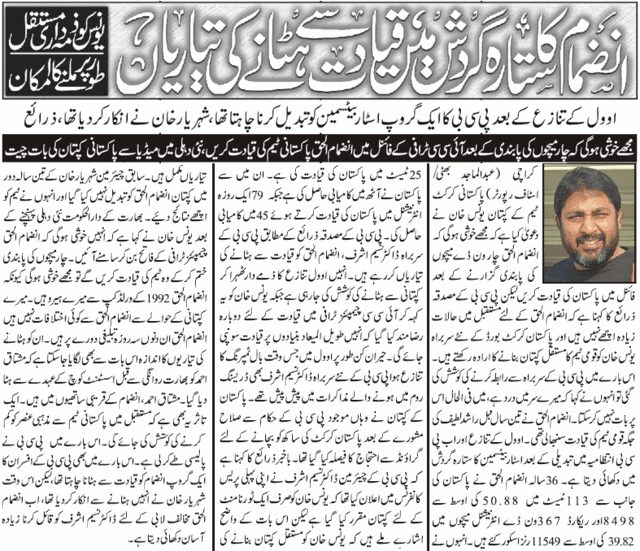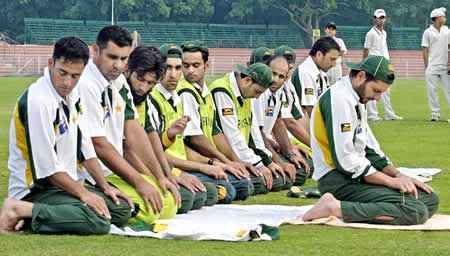Adil Najam
According to a Reuters report (CricInfo version here) Pakistan cricket players have “been advised to strike a balance between religion and cricket.” This according to Dr. Nasim Ashraf, the new Chairman of the Pakistan Cricket Board (PCB).
The report goes on to say:
Since last year, the Pakistan team has made it a point to pray in public and hold religious gatherings in team hotels. Ashraf said in a television interview he did not believe there was any connection between Maulvism, ultra orthodox Muslims, and cricket. “There is no doubt their religious faith is a motivating factor in the team. It binds them together. But there should be balance between religion and cricket,” Ashraf said.
Captain Inzamam-ul-Haq, batsman Mohammad Yousuf, who converted to Islam from Christianity earlier this year and former leg-spinner Mushtaq Ahmed have been in the forefront of projecting a religious image of the team. Ashraf said he had no problems with the players saying their prayers regularly but he had told Inzamam that Islam does not allow the imposition of views on others.
“I have told him clearly that there should be no pressure on players who don’t pray regularly or any compulsion on them to do it under pressure,” he said. “I have told him there should be no perception among players that if they don’t pray they will not be in the team… He has assured me there is no pressure on anyone to do anything they don’t want to do. I have also told him players should get proper rest for their cricket,” Ashraf added.
 The report does not come as a surprise (click on image to see story from Jang, 9 October), but it is still a bit of a shock.
The report does not come as a surprise (click on image to see story from Jang, 9 October), but it is still a bit of a shock.
I do not like the word ‘Maulvisim’. I do not know what it means, and whether that was the intent or not, it is likely to be seen as a slur and a coded attack. I worry greatly these days about an increasing tendency to use polarizing language, the use of which can only spell trouble in an already much-fractured society. I am hoping that it is a word coined by an over-eager Reuters reporter and not Dr. Nasim Ashraf.
I should add that I have known Doctor Sahib for some years. I know that personally he is a man of strong personal faith and religious conviction and for that reason alone I think he would be well suited to have discussions with the team on these issues in ways that others might not be able to. But such discussions are intensely personal and should remain private (but not secret). Please note that I am not calling for secrecy, but I do not think that Reuters wire services or television airwaves are the best medium for this conversation. I fear that in the glaring lights of the media circus , this important conversation will necessarily become polarized, simplistic, and accusatory and will degenerate towards crass finger-pointing, self-righteous chest-thumping, and loud but hollow sloganeering.
 I should thank Adnan Siddiqi’s blog (here) for first alerting me to this brewing controversy. Since then I have tried to keep a tab on this issue. Today, Teeth Maestro also has a commentary on his blog (here). My own views on this stem from the very same logic that had influenced my views on the story about Habib Bank requiring employees to trim their beards which I had commented on in the very earliest weeks on this blog (here). The parallels between the two are strikingly similar, but so are the principles:
I should thank Adnan Siddiqi’s blog (here) for first alerting me to this brewing controversy. Since then I have tried to keep a tab on this issue. Today, Teeth Maestro also has a commentary on his blog (here). My own views on this stem from the very same logic that had influenced my views on the story about Habib Bank requiring employees to trim their beards which I had commented on in the very earliest weeks on this blog (here). The parallels between the two are strikingly similar, but so are the principles:
- First, no one has the right to restrict anyone’s else’s right to personal expressions of belief and faith, no matter what that belief or faith might be.
It would be wrong, therefore, if PCB, ICC, or anyone else were to restrict the expression of personal faith by any set of players. Whether it is saying one’s prayers in public and in jamaat or growing a beard, that is a matter of personal choice. One’s inclusion in the team should not be a matter of whether one has (or does not have) facial hair. It should depend solely and only on one’s cricketing abilities. Despite the headline statement, a careful reading of the news item above suggests that the PCB is acknowledging that faith is a key “motivating factor” for this team and is not asking anyone to either restrict their beliefs or the expression of those beliefs. If it were ever to do so, it would be a matter of grave and serious concern indeed.
- Second, and relatedly, no one has the right to impose their own religious beliefs on others through direct or indirect pressure.
It would be wrong, therefore, if senior players were somehow pressurizing or forcing teammates to adopt a particular behavior. To repeat what I have already said above: One’s inclusion in the team should not be a matter of whether one has (or does not have) facial hair. It should depend solely and only on one’s cricketing abilities. A careful reading of the news item above makes clear that Inzimam, at least, understands that there should be (and is) no such pressure. If any players were ever to feel pressurized by the religious beliefs of their team-mates or were made to feel that their continued inclusion in the team would depend on their praying habits (rather than their playing abilities), then – and only then – it would be a matter of grave and serious concern indeed.
My only hope right now is that the media circus – in Pakistan and abroad – will not sensationalize this important issue and force even greater fissures and polarizations than already exist. I fear that this hope will not be realized.
But let me also say that I have much greater confidence in Inzimam, his teammates and Dr. Nasim Ashraf and pray that they will resist the media’s provocations and will refuse to fall into petty bickering or sloganeering opportunities.




















































We should be proud of it. God bless those who are trying to promot most peaceful religion.